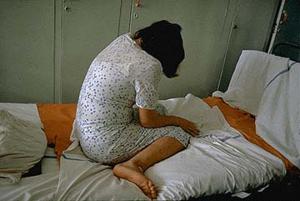- Caroline Criado-Perez
What is a ‘just war’?

In a recent article for Women Under Seige, Soraya L. Chemaly explains the current conception of what we consider ‘just’: we tally the numbers of deaths, suicides, executions, and decide if the end justifies the mortalities.
But does this focus on mortalities reflect the true horror of war? Or does it merely reflect a continuation of the patriarchal understanding of war as a male activity? As Chemaly starkly notes, ‘We measure what we think is important. Rape hasn’t usually made the cut.’
But why not?
The exclusion of rape from consideration reflects the concept that war is a male activity. Women are not traditionally ‘combatants’. But as Schemaly points out, ‘For women during war, all men are potential weapons’. Women become combatants by default; their bodies are co-opted by either side in a brutal, psychological warfare that too often is seen as collateral damage – not integral to battle.
Nowhere are the effects of this kind of default attitude clearer than in the fall-out from the war in Bosnia & Herzegovina. This brutal conflict involved systematic rape on an unprecedented scale, including the establishment of ‘rape camps’. Those who managed to escape these camps speak of women being passed from soldier to soldier, of being raped into unconsciousness, of young girls being raped to death.
Women were often raped in front of their families and their husbands; their bodies were turned into psychological missiles, perfectly targeted to ‘break’ the enemy. Men’s bodies may have been weapons against women; but women’s bodies became devastatingly effective weapons against their own families and communities. They also became life-long weapons against themselves: the women who suffered from the brutal systematic rape employed in this three year armed conflict still live with the memories of their ordeal – and they always will.
And yet despite this horrifying deployment of women’s bodies as psychological weapons, the Bosnian government does not seem to properly count these women as casualties of war – and I mean literally count: while the number of soldiers killed is pretty well documented, the number of women raped remains unknown.
The effects of this attitude are clear: Amnesty reports that the Bosnian authorities ‘have neglected their obligation to provide justice and reparation to survivors of war crimes of sexual violence’. By this Amnesty means that, while ‘many perpetrators of the war crimes of sexual violence enjoy impunity’, often living ‘in the same communities as their victims’, the victims themselves struggle to access psychological support and health services. Unsupported, many fail to find work, haunted as they are by memories of their past.
Not only do these women also therefore live in poverty as a direct consequence of actions which mainly remain unpunished, but they also often live with the instability of knowing they could at any time lose their home. The Dayton Accords peace agreement advocated property restitution for survivors of sexualised violence. The government of Bosnia-Herzegovina even instituted a law in 2006, which stated that “homes should be provided for victims of sexual torture during the war”. But in a classic case of passing the buck, the Ministry for Human Rights and Refugees told CNN that it was “not clear who should implement the act, and there is no agency making sure the law is enforced.”
So no-one is.
This has led to women like Jasmina living in properties that they do not own, and from which they could be evicted at any time. And while the Sarajevo municipality that owns Jasmina’s apartment says that it does not plan to evict her, that is scant comfort for a woman who was brutally shown the folly of placing trust in anyone.
This neglect means that women in Bosnia remain psychologically and practically haunted by their experiences. Meanwhile, the men who used their bodies as weapons often walk freely past these women’s old homes.
Where’s the justice in that?
